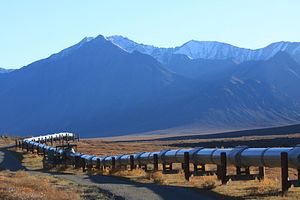After a disappointing series of conversations with U.S. Secretary of Defense Chuck Hagel, Pakistan announced that it would take steps to bolster its fragile energy security situation by doubling-down on cooperation with Iran over an ongoing gas pipeline project. The pipeline between the two countries will enable the transfer of gas from Iran’s South Pars facilities to Pakistan. Iran has successfully constructed most of the 900 kilometer pipeline up to the Pakistani border. The United States opposes the project.
The pipeline project initially faced a deadline of winter 2014 but due to repeated delays, gas is not expected to flow from Iran to Pakistan until sometime later that year. Reportedly, Pakistan would be contractually obligated to pay Iran US$1 million for every day of delay on the project beyond its agreed-upon deadline. The decision to speed up efforts this time came from a meeting between Pakistani and Iranian officials in Tehran. According to Dawn, “[Pakistan] Federal Minister for Petroleum and Natural Resources Shahid Khaqan Abbasi and Iranian Minister of Petroleum Bijan Namdar Zangeneh held at the Ministry of Petroleum at Tehran on Monday.” The two countries agreed to “formulate a road map” to proceed with the gas pipeline project, focusing on bolstering coordination and cooperation on the development of the pipeline.
The United States has expressed opposition to the multi-billion dollar energy infrastructure project between the two neighbors over concerns regarding the comprehensive sanctions against Iran over its nuclear program. The recent U.S.-Iran detente in Geneva has not changed this. The Pakistan foreign ministry could have strategically released this information in the wake of Chuck Hagel’s visit to emphasize to the United States that Pakistan could take unilateral steps in its economic interests that would be contrary to American interests.
Reports emerged towards the conclusion of Hagel’s visit that the United States may withhold aid from Pakistan over anti-American protests that have disabled the strategically important Ground Lines of Communications (GLOC) that permit the United States and its NATO coalition partners to extract equipment from Afghanistan. Pakistan’s Prime Minister Nawaz Sharif also looked elsewhere for economic support as he turned to the European Union on Tuesday, after the conclusion of his talks with Hagel.
The United States, in 2010, asked Pakistan to cease cooperating with Iran on the pipeline project and instead proposed a U.S.-funded pipeline to transfer liquefied natural gas to the energy-starved country from Tajikistan, through Afghanistan’s Wakhan Corridor. Pakistan ignored the American offer and signed the deal with Iran anyway, pointing to its overwhelming benefit to Pakistan’s national interests. The U.S. has at time raised the possibility that it will sanction Pakistan if it purchases natural gas from Iran. The pipeline also caused some tension between Pakistan and Saudi Arabia which offered its own energy package in exchange for Pakistan abandoning its activities with Iran over the pipeline.
Negotiations between Iran and Pakistan on the pipeline began in the mid-1990s, resulting in a preliminary agreement in 1995. Iran later coordinated an extension of the proposed pipeline to India. Earlier this year, Iran’s Tadbir Energy and Pakistan Interstate Gas Company (ISGC) signed an agreement to jointly construct the pipeline on the Pakistani side. The construction was later inaugurated by Mahmoud Ahmadinejad and Ali Asif Zardari.
Some doubts exist about the viability of the pipeline for Pakistan. The Sustainable Policy Development Institute assesses that the pipeline overwhelmingly favors Iran due to the pricing structure incorporated into the contract between the two countries. Iran is importing gas at the price of $4/MMBtu from Turkmenistan, a price which is uncorrelated with prevailing global prices for oil. In its exports to Pakistan, Iran has pegged the price at $14/MMBtu — a price that is periodically revisited and updated in line with market conditions. The SPDI report concludes that “This is a death sentence for Pakistan’s economy and it is unfortunate on behalf of Pakistan who has blatantly ignored the energy dynamics and its pricing while going for this deal.”

































